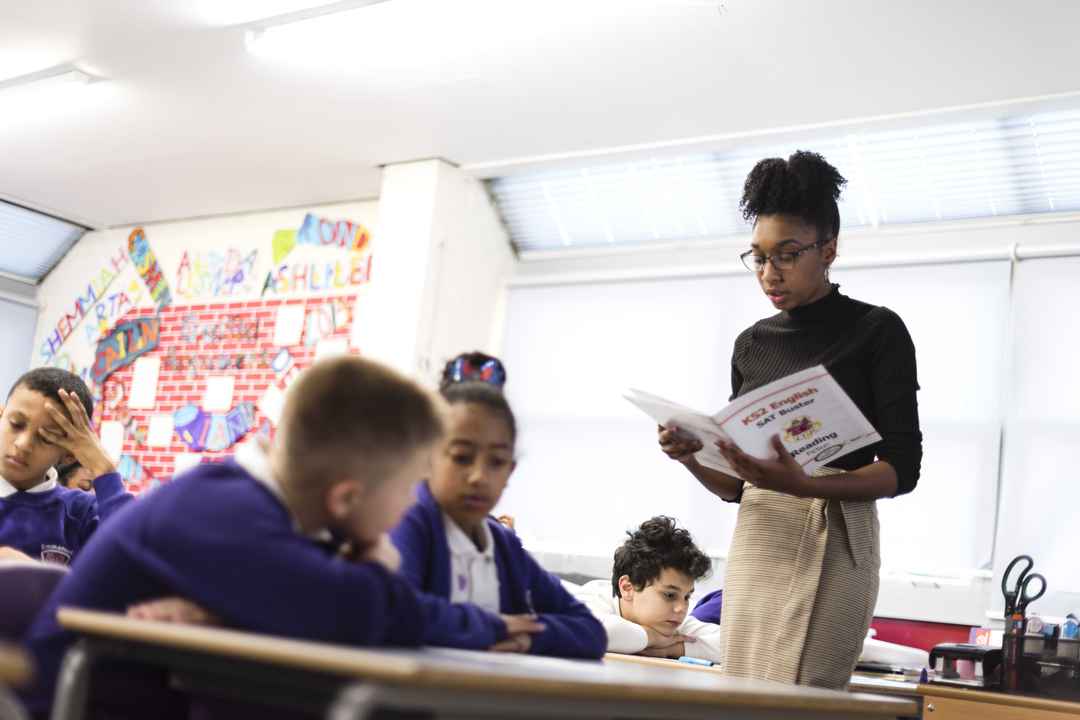Leading literacy across a school: a coordinated approach
Share this page
Date published 10 August 2022
Ambition Institute literacy expert Sarah Bagshaw-McCormick explores how using a coordinated approach across a school when teaching literacy can strengthen your curriculum. She suggests techniques you can use in your practice and recommends some further reading.
Leading literacy is hard, because literacy is taught in every lesson in every moment of every day. This is powerful when we get it right, because every moment can be used to contribute to pupils’ development.
Effective leadership of literacy requires a coordinated approach, to enable all pupils to develop their literacy knowledge and skills across the school.
Too often, as a result of time pressures and challenges in accessing the evidence, literacy is implemented as an add-on or in isolation. Sometimes it’s delivered through discrete lessons, assemblies and one-off events that are disconnected from the school curriculum and culture. Members of school communities enjoy these events and get involved, but the motivation and engagement cultivated by the events is not long-lasting.
One-off approaches to literacy are likely to have a limited effect on pupils’ literacy learning and outcomes, because they don’t support pupils to learn, apply and transfer their knowledge. Transfer means being able to use knowledge and skills in a variety of contexts (Rose and Didau, 2016).
One way to combat this is to take a coordinated approach. This means creating connections between the way literacy is experienced and taught in your school and providing all teachers with the knowledge they need to teach common aspects of literacy through their subject area and phase. By developing a shared understanding and language of literacy, leaders can support pupils to transfer their knowledge across the curriculum. By teaching spoken language, reading and writing across school contexts, pupils will revisit, reinforce and practise their literacy learning. This will support pupils to build fluent mental models (a network of linked knowledge), flexible knowledge (that can be used in a variety of settings) and fluency (the ability to use some literacy knowledge and skills unconsciously).
This does not mean that every teacher in every subject or phase should be teaching the same literacy skills, the same way. Rather, that a literacy leader can cultivate a shared language and knowledge of general literacy that will enable teachers to build on pupils’ prior knowledge to encourage the use of general literacy in ways that are useful in their subjects.
A coordinated approach might mean, using the language of phonics programmes, from pupils’ early reading to talk about how they can use phonic approaches to spelling of unfamiliar words. For example, ‘Asha, the word photosynthesis has five syllables, how can we use segmenting to help us to spell this unfamiliar word.’

To ensure they have a coordinated approach, a literacy lead might want to ensure that any apps, games or literacy schemes they use with pupils have a common language, and matches the language used by literacy teachers and leaders. For example, conjunctions are sometimes called connectives. If pupils are taught about connectives in one resource and conjunctions in another, it may confuse them and prevent them from connecting the knowledge they are learning in different settings. A literacy leader may need to choose the terms they will use across the school.
Developing the knowledge and strategies for all staff to teach literacy will empower all teachers and leaders to contribute to all pupils’ literacy development. This will improve pupils learning, outcomes and wellbeing.
Here is some further reading which you might find useful for your practice:
Transfer
Didau, D. (2016, 17 Oct) The trouble with transfer: How can we make learning more flexible? [blog]. Retrieved from https://learningspy.co.uk/learning/trouble-transfer-can-make-learning-flexible/ (Links to an external site.)
Didau, D and Rose, N. (2016). What Every Teacher Needs to Know about…Psychology. John Catt Educational Ltd.
Teaching and leading literacy
Shanahan, (2017). Disciplinary literacy: the basics
Shanahan, T., & Shanahan, C. (2008). Teaching disciplinary literacy to adolescents: Rethinking content-area literacy. Harvard educational review, 78(1), 40-59.
Leading literacy effectively
Creating a coordinated approach across a school when teaching literacy can strengthen your curriculum, and is one of the approaches you’ll learn on our National Professional Qualification in Leading Literacy (NPQLL). Click here to apply.
